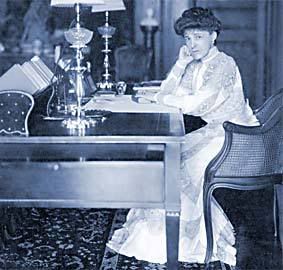Edith Wharton is one of my favorite female authors. I've read almost every book she's written and my favorite is House of Mirth. ~Katie
About A Backward Glance (amazon.com):
"A Backward Glance is Edith Wharton's vivid account of both her public and her private life. With richness and delicacy, it describes the sophisticated New York society in which Wharton spent her youth, and chronicles her travels throughout Europe and her literary success as an adult. Beautifully depicted are her friendships with many of the most celebrated artists and writers of her day, including her close friend Henry James.
In his introduction to this edition, Louis Auchincloss calls the writing in A Backward Glance "as firm and crisp and lucid as in the best of her novels." It is a memoir that will charm and fascinate all readers of Wharton's fiction."
(PG 47): "The sentimental theory that children must not be made to study anything that does not interest them was already in the air, and reinforced by the fear of "fatiguing" my brain, it made my parents turn my work into play. Being deprived of the irreplaceable grounding of Greek and Latin, I never learned to concentrate except on subjects naturally interesting to me, and developed a restless curiosity which prevented my fixing my thoughts for long even on these."
(PG 100): "(My husband) taught me never again, when I had the chance to do something difficult and wonderful, must I hesitate to trust to my star-the only condition being that the risk should not be run for anything not really worth it."
(PG 169, from the chapter entitled "Henry James"): " "What is one's personality, detached from that of the friends with whom fate happens to have linked one? I cannot think of myself apart from the influence of the two or three greatest friendships of my life, and any account of my own growth must be that of their stimulating and enlightening influence."
(Henry James to Edith about her lack of ability to memorize poetry): " 'It's just because you are dazzled'. It was only afterward that I saw he had really said all there was to say: that the gift of precision in ecstasy (the best definition I can find for the highest poetry) is probably almost as rare in the appreciator as in the creator, and my years of intellectual solitude had made me so super-sensitive to the joys of great talk that precise recording was impossible to me."
(PG 176): "Henry James was essentially a novelist of manners, and the manners he was qualified by nature and situation to observe were those of the little vanishing group of people among whom he had grown up, or their more picturesque prototypes in older societies."
(PG 178): "Henry James' slow way of talking was actually a way he used to cover up a stutter that 'in his boyhood had been thought incurable'."
-Henry James cannot handle even the slightest criticism offended his delicate sensibilities. ("We all saw, that even this slight, and quite involuntary, criticism, had wounde his morbidly delicate sensibilities"--(PG 190)
(PG 191): "This sensitiveness to criticism or comment of any sort (towards Henry James) had nothing to do with vanity; it was caused by the great artist's deep consciousness of his powers, combined with a bitter, a life-long disappointment at his lack of popular recognition. I am not sure that Henry James had not secretly dreamed of being a 'best seller' in the days when that odd form of literary fame was at its height."
(PG 212): "If one has sought the publicity of print, and sold one's wares in the open market, one has sold to the purchasers the right to think what they choose about one's books; and the novelist's best safeguard is to put out of his mind the quality of the praise or blame bestowed on him by reviewers and readers, and to write only for that dispassionate and ironic critic who dwells within the breast."

No comments:
Post a Comment